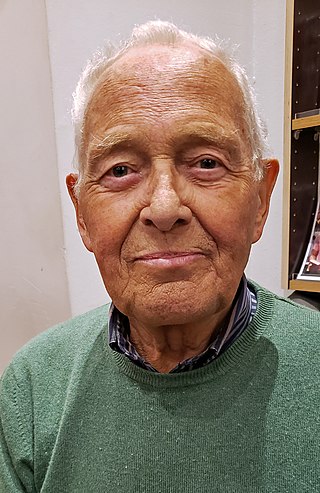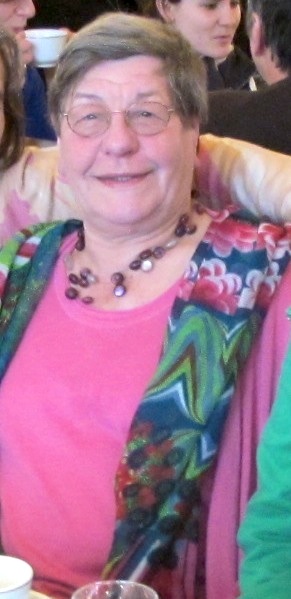
Ernst Klee was a German journalist and author. As a writer on Germany's history, he was best known for his exposure and documentation of medical crimes in Nazi Germany, much of which was concerned with the Action T4 or involuntary euthanasia program. He is the author of "The Good Old Days": The Holocaust Through the Eyes of the Perpetrators and Bystanders first published in the English translation in 1991.

Katja Lange-Müller is a German writer living in Berlin. Her works include several short stories and novellas, radio dramas, and dramatic works.
Michael Bochow is a German sociologist who has authored a number of empirical studies of German gay men with a particular focus on the impact of HIV/AIDS.
Landscape mythology and anthropology of landscape are terms for a field of study advocated since about 1990 by Kurt Derungs. Derungs describes the field as an interdisciplinary approach to landscape combining archaeology, ethnology and mythology.
Gisela Bleibtreu-Ehrenberg is a German sociologist, ethnologist, sexologist, and writer further specializing into the fields of psychology, Indo-European studies, religious studies, and philosophy, since 1980 also increasingly anthropology. As Bleibtreu-Ehrenberg uses these approaches in research particularly in the fields of sexology, homophobia, and prejudice studies, the US Society of Lesbian and Gay Anthropologists of the American Anthropological Association ranked Bleibtreu-Ehrenberg's works on homophobia as internationally outstanding.

Wolfram Setz was a German historian, editor, translator, and essayist.
Ruth Margarete Roellig was a German writer, she is known for documenting Berlin's lesbian club scene of the late 1920s during the Weimar Republic. Additionally she published support of Nazism starting in the 1930s, and she stopped writing after the end of World War II.
Centrum Schwule Geschichte e. V., abbreviated CSG, is a German "LGBT" organization based in Cologne (Köln).

The memorial to gay and lesbian victims of National Socialism is a monument in Cologne, Germany, dedicated to the gay and lesbian victims of the Nazis.
Christa Reinig was a German poet, fiction and non-fiction writer, and dramatist. She began her career in the Soviet occupation zone which became East Berlin, was banned there, after publishing in West Germany, and moved to the West in 1964, settling in Munich. She was openly lesbian. Her works are marked by black humor, and irony.
Carl-Heinz Rodenberg, sometimes known as Karl-Heinz Rodenberg was a German neurologist and psychiatrist. Rodenberg was proficient in the murder of mental patients by the Nazis, the Action T4 "euthanasia" program, and from 1943 was scientific director of the Reich Central Office for the Combating of Homosexuality and Abortion.
Beatrix Borchard is a German musicologist and author. The focus of her publications is the life and work of female and male musicians, such as Clara and Robert Schumann, Amalie and Joseph Joachim, Pauline Viardot-Garcia, and Adriana Hölszky. Also among her topics are the role of music in the process of Jewish assimilation, the history of musical interpretation, and strategies of Kulturvermittlung.

Eva Rieger is a German musicologist. Rieger specialized in the social and cultural history of women in music. Together with the German-Swiss patron Mariann Steegmann, Rieger founded the Mariann-Steegmann-Foundation, which is dedicated to the advancement of women in music and the arts. In 2012, she was appointed Honorary Senator of the Hochschule für Musik und Theater Hamburg.

Ilse Kokula is a German sociologist, educator, author and lesbian activist in the field of lesbian life. She was awarded the Order of Merit of the Federal Republic of Germany.
Ilse Erika Korotin is an Austrian philosopher and sociologist. She researched and published on the history of ideas of Nazism. At the Institute for Science and Art in Vienna, she heads the Documentation Centre for Women's Studies. Her work focuses on feminist biographical research and history of science.

Die BIF – Blätter Idealer Frauenfreundschaften, subtitled Monatsschrift für weibliche Kultur, was a short-lived lesbian magazine of Weimar Germany, published from either 1925 or 1926 until 1927 in Berlin. Founded by lesbian activist Selli Engler, Die BIF was part of the first wave of lesbian publications in history and the world's first lesbian magazine to be published, edited and written solely by women.

Charlotte "Lotte" Hedwig Hahm was a prominent activist of the lesbian movement in Berlin during the Weimar Republic, National Socialist period, and after 1949, in the Federal Republic of Germany.
Martina Wagner-Egelhaaf is a Professor of German Literature at the University of Münster, Germany, and holds a chair in German Literary History with special focus on Modernity and Contemporary Literature. Her fields of research include Autobiography/Autofiction, Literary Theory, Rhetoric, Literary and Cultural Studies, Gender Studies, the relation of Religion, Politics and Literature as well as Law and Literature.

Elli Smula (1914–1943) was a Berlin tram conductor who was arrested in September 1940. She was accused of seriously compromising the Berlin Transport Authority (BVG) by failing to report for work after going out drinking with female fellow workers. Like her colleague Margarete Rosenberg, she was detained by the Gestapo in the prison on Alexanderplatz. BVG had received complaints that some of their female employees were taking their colleagues home, encouraging them to consume alcoholic drinks and involving them in lesbian sexual relationships. The following November both women were transferred to the Ravensbrück Concentration Camp where Smula "suddenly died" on 8 July 1943.

In Nazi Germany, lesbians who were sent to concentration camps were often categorized as "asocial", if they had not been otherwise targeted based on their ethnicity or political stances. Female homosexuality was criminalized in Austria, but not other parts of Nazi Germany. Because of the relative lack of interest of the Nazi state in female homosexuality compared to male homosexuality, there are fewer sources to document the situations of lesbians in Nazi Germany.










